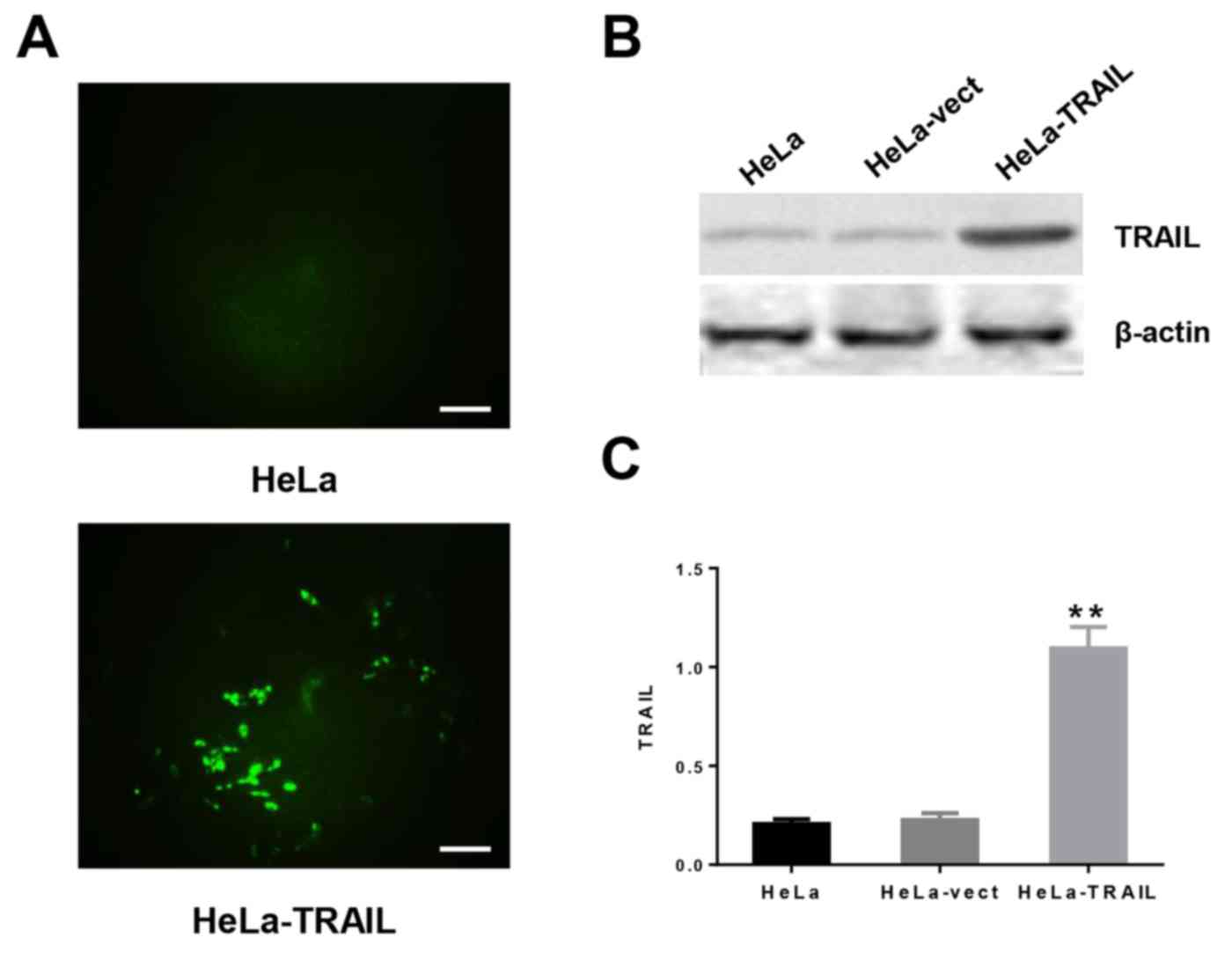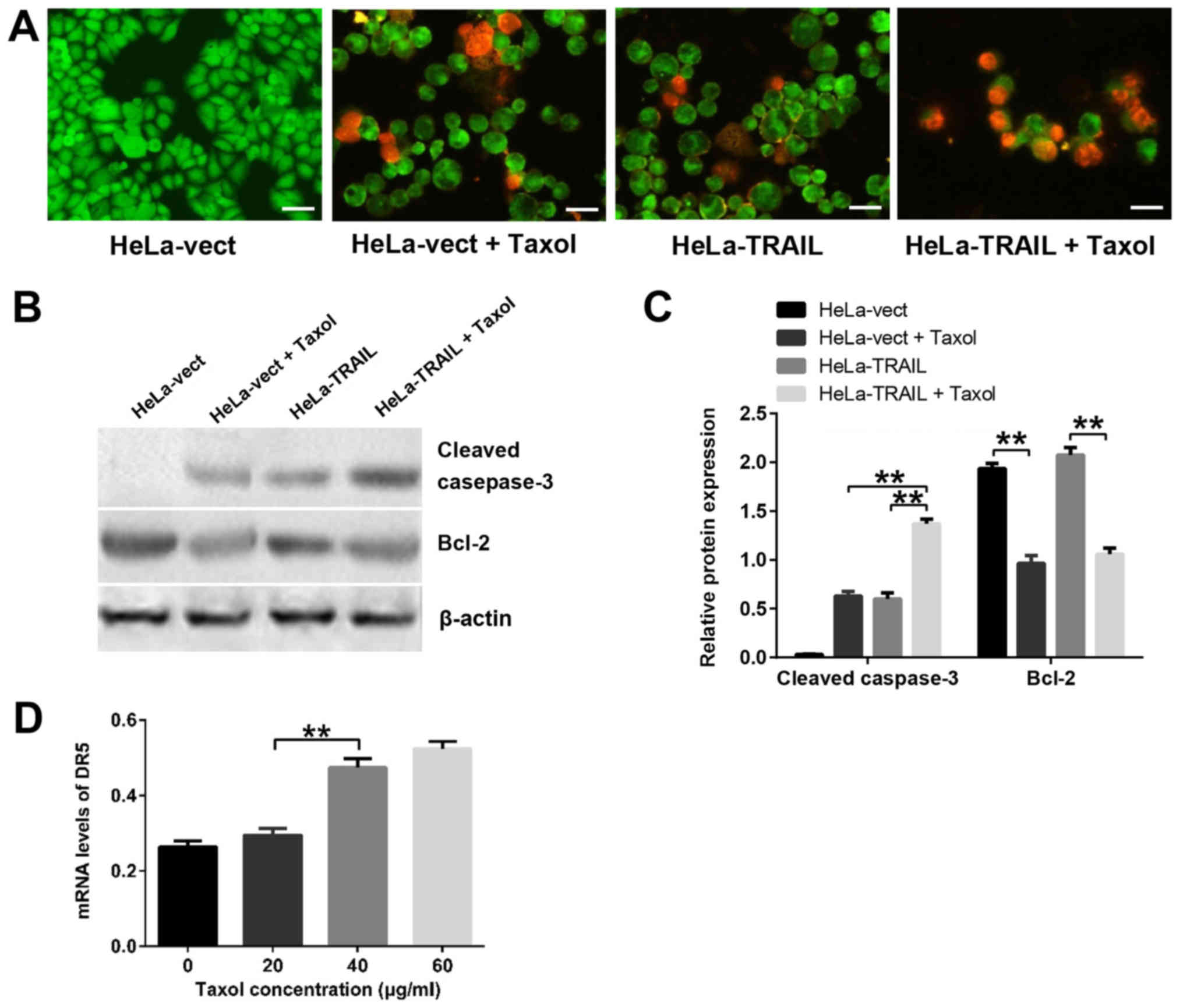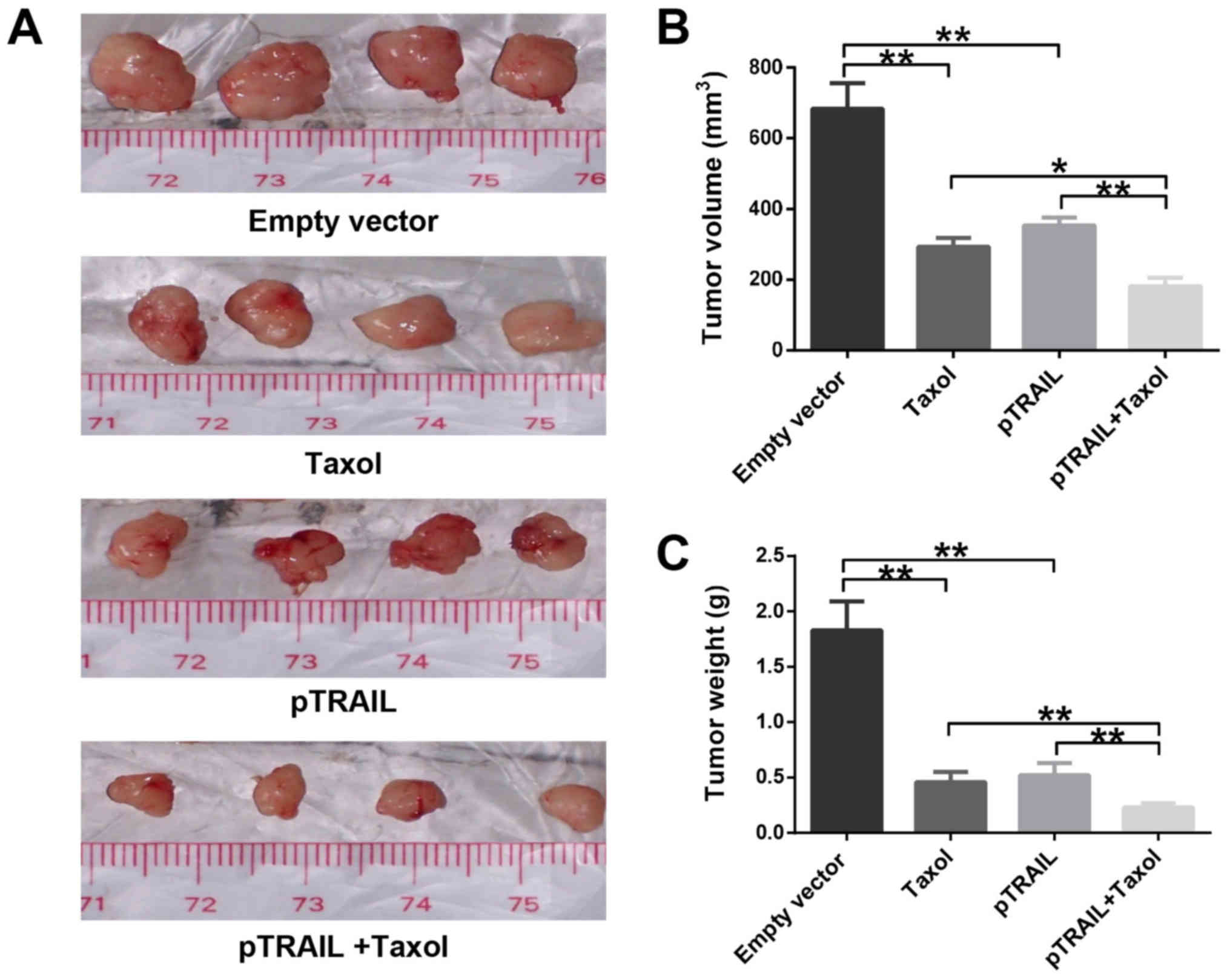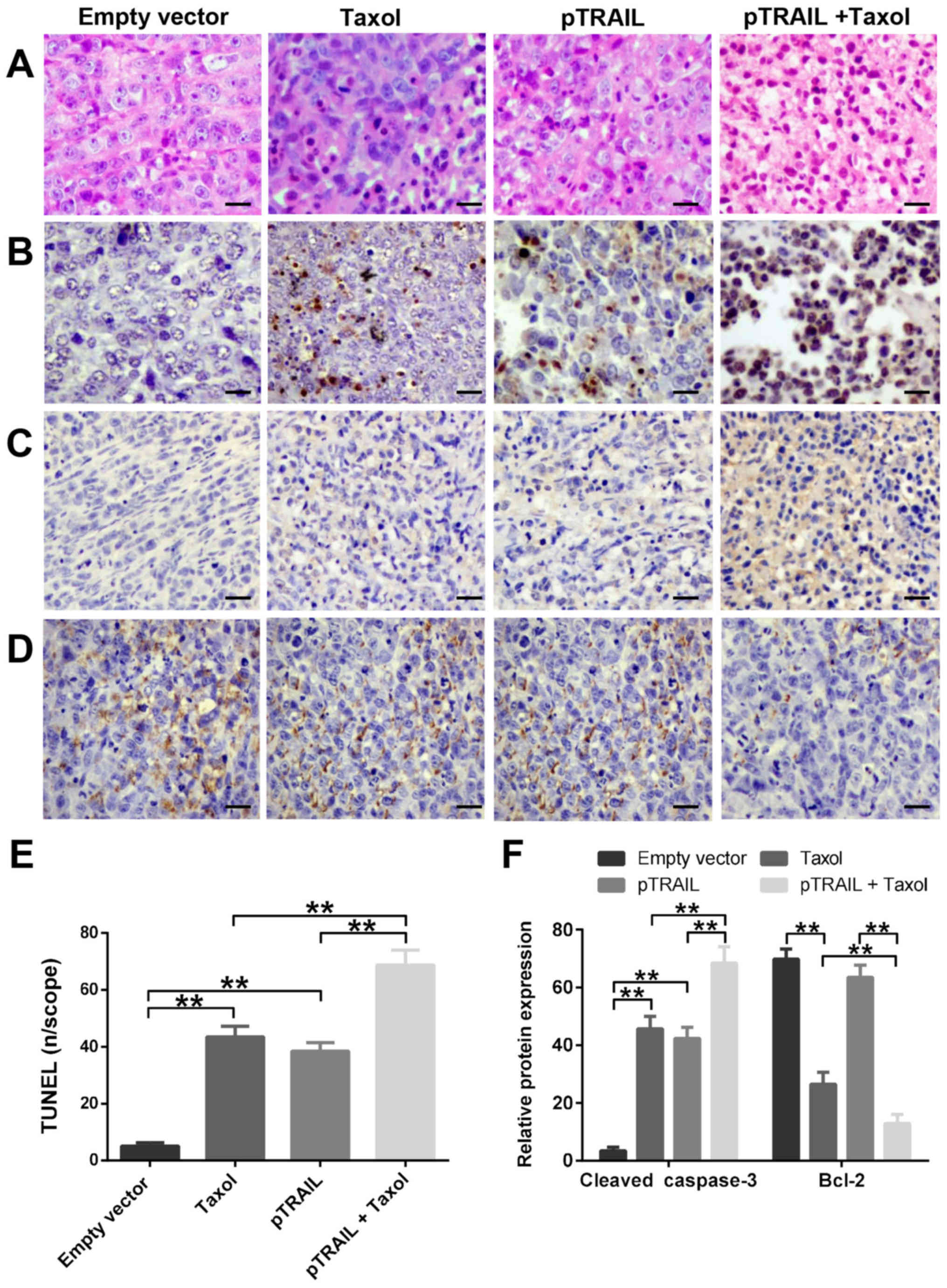|
1
|
Global Burden of Disease Cancer
Collaboration, ; Fitzmaurice C, Dicker D, Pain A, Hamavid H,
Moradi-Lakeh M, MacIntyre MF, Allen C, Hansen G, Woodbrook R, et
al: The global burden of cancer 2013. JAMA Oncol. 1:505–527. 2015.
View Article : Google Scholar : PubMed/NCBI
|
|
2
|
Crosbie EJ, Einstein MH, Franceschi S and
Kitchener HC: Human papillomavirus and cervical cancer. Lancet.
382:889–899. 2013. View Article : Google Scholar : PubMed/NCBI
|
|
3
|
Jemal A, Siegel R, Ward E, Hao Y, Xu J,
Murray T and Thun MJ: Cancer statistics, 2008. CA Cancer J Clin.
58:71–96. 2008. View Article : Google Scholar : PubMed/NCBI
|
|
4
|
Siegel RL, Miller KD and Jemal A: Cancer
statistics, 2016. CA Cancer J Clin. 66:7–30. 2016. View Article : Google Scholar : PubMed/NCBI
|
|
5
|
Yee GP, de Souza P and Khachigian LM:
Current and potential treatments for cervical cancer. Curr Cancer
Drug Targets. 13:205–220. 2013. View Article : Google Scholar : PubMed/NCBI
|
|
6
|
Johnstone RW, Frew AJ and Smyth MJ: The
TRAIL apoptotic pathway in cancer onset, progression and therapy.
Nat Rev Cancer. 8:782–798. 2008. View
Article : Google Scholar : PubMed/NCBI
|
|
7
|
Ashkenazi A and Dixit VM: Apoptosis
control by death and decoy receptors. Curr Opin Cell Biol.
11:255–260. 1999. View Article : Google Scholar : PubMed/NCBI
|
|
8
|
Falschlehner C, Emmerich CH, Gerlach B and
Walczak H: TRAIL signalling: Decisions between life and death. Int
J Biochem Cell Biol. 39:1462–1475. 2007. View Article : Google Scholar : PubMed/NCBI
|
|
9
|
Horak P, Pils D, Kaider A, Pinter A,
Elandt K, Sax C, Zielinski CC, Horvat R, Zeillinger R, Reinthaller
A and Krainer M: Perturbation of the tumor necrosis factor-related
apoptosis-inducing ligand cascade in ovarian cancer: Overexpression
of FLIPL and deregulation of the functional receptors DR4 and DR5.
Clin Cancer Res. 11:8585–8591. 2005. View Article : Google Scholar : PubMed/NCBI
|
|
10
|
Martinez-Ferrandis JI, Rodríguez-López R,
Milne RL, González E, Cebolla E, Chirivella I, Zamora P, Arias JI,
Palacios S, Cervantes A, et al: Polymorphisms in TRAIL receptor
genes and risk of breast cancer in Spanish women. Cancer Biomark.
3:89–93. 2007. View Article : Google Scholar : PubMed/NCBI
|
|
11
|
Sanlioglu AD, Korcum AF, Pestereli E,
Erdogan G, Karaveli S, Savas B, Griffith TS and Sanlioglu S: TRAIL
death receptor-4 expression positively correlates with the tumor
grade in breast cancer patients with invasive ductal carcinoma. Int
J Radiat Oncol Biol Phys. 69:716–723. 2007. View Article : Google Scholar : PubMed/NCBI
|
|
12
|
Gliniak B and Le T: Tumor necrosis
factor-related apoptosis-inducing ligand's antitumor activity in
vivo is enhanced by the chemotherapeutic agent CPT-11. Cancer Res.
59:6153–6158. 1999.PubMed/NCBI
|
|
13
|
Hori T, Kondo T, Kanamori M, Tabuchi Y,
Ogawa R, Zhao QL, Ahmed K, Yasuda T, Seki S, Suzuki K and Kimura T:
Ionizing radiation enhances tumor necrosis factor-related
apoptosis-inducing ligand (TRAIL)-induced apoptosis through
up-regulations of death receptor 4 (DR4) and death receptor 5 (DR5)
in human osteosarcoma cells. J Orthop Res. 28:739–745.
2010.PubMed/NCBI
|
|
14
|
Sussman RT, Ricci MS, Hart LS, Sun SY and
El-Deiry WS: Chemotherapy-resistant side-population of colon cancer
cells has a higher sensitivity to TRAIL than the non-SP, a higher
expression of c-Myc and TRAIL-receptor DR4. Cancer Biol Ther.
6:1490–1495. 2007. View Article : Google Scholar : PubMed/NCBI
|
|
15
|
Finnberg NK, Gokare P, Navaraj A, Lang
Kuhs KA, Cerniglia G, Yagita H, Takeda K, Motoyama N and El-Deiry
WS: Agonists of the TRAIL death receptor DR5 sensitize intestinal
stem cells to chemotherapy-induced cell death and trigger
gastrointestinal toxicity. Cancer Res. 76:700–712. 2016. View Article : Google Scholar : PubMed/NCBI
|
|
16
|
Oliver PG, LoBuglio AF, Zhou T, Forero A,
Kim H, Zinn KR, Zhai G, Li Y, Lee CH and Buchsbaum DJ: Effect of
anti-DR5 and chemotherapy on basal-like breast cancer. Breast
Cancer Res Treat. 133:417–426. 2012. View Article : Google Scholar : PubMed/NCBI
|
|
17
|
Weaver BA: How Taxol/paclitaxel kills
cancer cells. Mol Biol Cell. 25:2677–2681. 2014. View Article : Google Scholar : PubMed/NCBI
|
|
18
|
Ao X, Nie P, Wu B, Xu W, Zhang T, Wang S,
Chang H and Zou Z: Decreased expression of microRNA-17 and
microRNA-20b promotes breast cancer resistance to taxol therapy by
upregulation of NCOA3. Cell Death Dis. 7:e24632016. View Article : Google Scholar : PubMed/NCBI
|
|
19
|
Li W, Wan L, Zhai LY and Wang J: Effects
of SC-560 in combination with cisplatin or taxol on angiogenesis in
human ovarian cancer xenografts. Int J Mol Sci. 15:19265–19280.
2014. View Article : Google Scholar : PubMed/NCBI
|
|
20
|
Peng C, Hao Y, Zhao Y, Sun Q, Zhao X and
Cong B: Effect of Smac and Taxol on non-small-cell lung cancer.
Acta Biochim Biophys Sin (Shanghai). 46:387–393. 2014. View Article : Google Scholar : PubMed/NCBI
|
|
21
|
Johnstone RW, Ruefli AA and Lowe SW:
Apoptosis: A link between cancer genetics and chemotherapy. Cell.
108:153–164. 2002. View Article : Google Scholar : PubMed/NCBI
|
|
22
|
Gao L, Zhang L, Hu J, Li F, Shao Y, Zhao
D, Kalvakolanu DV, Kopecko DJ, Zhao X and Xu DQ: Down-regulation of
signal transducer and activator of transcription 3 expression using
vector-based small interfering RNAs suppresses growth of human
prostate tumor in vivo. Clin Cancer Res. 11:6333–6341. 2005.
View Article : Google Scholar : PubMed/NCBI
|
|
23
|
Li X, Zhang L, Shao Y, Liang Z, Shao C,
Wang B, Guo B, Li N, Zhao X, Li Y and Xu D: Effects of a human
plasma membrane-associated sialidase siRNA on prostate cancer
invasion. Biochem Biophys Res Commun. 416:1–276. 2011. View Article : Google Scholar : PubMed/NCBI
|
|
24
|
Fan QL, Zou WY, Song LH and Wei W:
Synergistic antitumor activity of TRAIL combined with
chemotherapeutic agents in A549 cell lines in vitro and in vivo.
Cancer Chemother Pharmacol. 55:189–196. 2005. View Article : Google Scholar : PubMed/NCBI
|
|
25
|
Chen L, Chen D, Gong M, Na M, Li L, Wu H,
Jiang L, Qian Y, Fang G and Xue X: Concomitant use of Ad5/35
chimeric oncolytic adenovirus with TRAIL gene and taxol produces
synergistic cytotoxicity in gastric cancer cells. Cancer Lett.
284:141–148. 2009. View Article : Google Scholar : PubMed/NCBI
|
|
26
|
Horinaka M, Yoshida T, Shiraishi T, Nakata
S, Wakada M, Nakanishi R, Nishino H and Sakai T: The combination of
TRAIL and luteolin enhances apoptosis in human cervical cancer HeLa
cells. Biochem Biophys Res Commun. 333:833–838. 2005. View Article : Google Scholar : PubMed/NCBI
|
|
27
|
Pazarentzos E and Mazarakis ND: Anticancer
gene transfer for cancer gene therapy. Adv Exp Med Biol.
818:255–280. 2014. View Article : Google Scholar : PubMed/NCBI
|
|
28
|
Zhang L, Gao L, Zhao L, Guo B, Ji K, Tian
Y, Wang J, Yu H, Hu J, Kalvakolanu DV, et al: Intratumoral delivery
and suppression of prostate tumor growth by attenuated Salmonella
enterica serovar typhimurium carrying plasmid-based small
interfering RNAs. Cancer Res. 67:5859–5864. 2007. View Article : Google Scholar : PubMed/NCBI
|



















